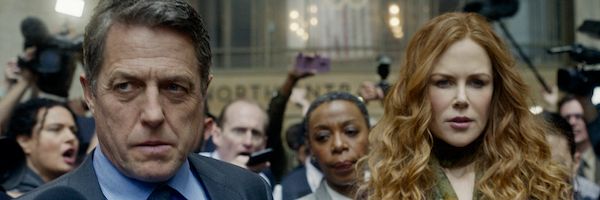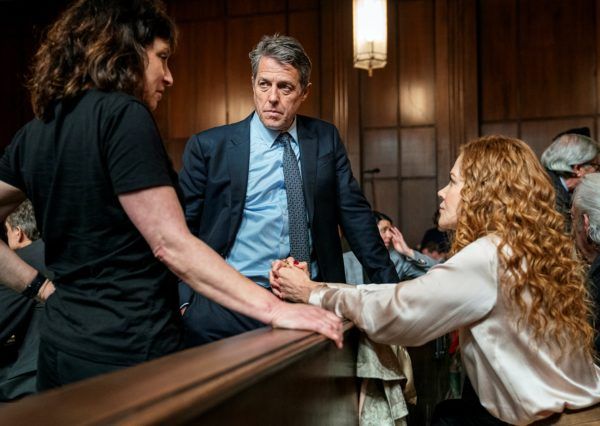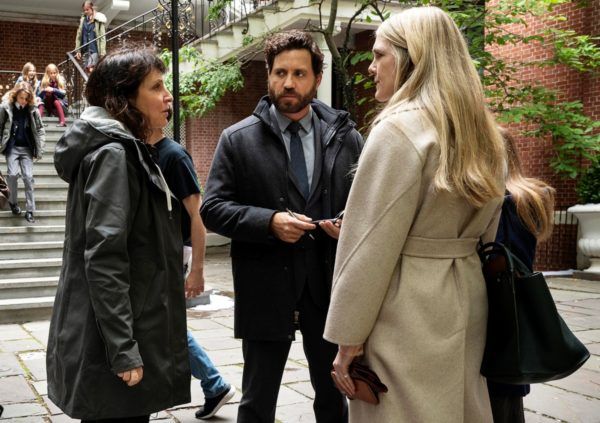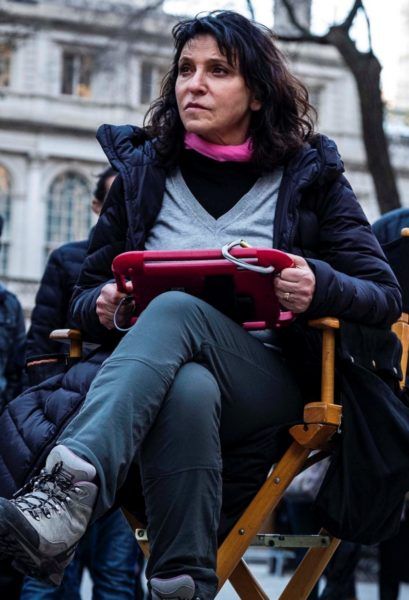Directed and executive produced by Susanne Bier and created and written for television by David E. Kelley, who also serves as showrunner, the HBO limited series The Undoing follows Grace (Nicole Kidman) and Jonathan Fraser (Hugh Grant), who have a seemingly perfect life until the revelation of secrets and lies threatens to undo it all. When a violent death changes everything, Grace must figure out what that means for her family and how to pick up the pieces.
During this 1-on-1 phone interview with Collider, we spoke with Bier about why she was so drawn to the script for the first episode of this series, tackling directing an entire season, why Hugh Grant was the right actor for this character, why working with actors is so exciting for a filmmaker, keeping the courtroom scenes interesting, and what audiences might think of the ending.
Collider: It sounds like this project came your way with David E. Kelley and Nicole Kidman already involved with it, which must be enticing. What was it about this that made you want to sign on? What was the appeal for you?
SUSANNE BIER: Of course, David E. Kelley and Nicole Kidman is definitely a seductive entity on its own. But I read the first version of the first episode that David had written and I was immediately drawn to the world and essentially to that sense, which is actually the main undercurrent of the entire series, of chaos that swallows you up when you realize that somebody whom you knew turns out to be totally different. The world which you thought was very robust and firmly settled just falls apart. It was unreal while still feeling real. I just thought that was incredibly exciting and weirdly cinematic, actually. And so, I said yes after having read that first episode, and it just got better and better and more exciting.
The Night Manager was the first time you had signed on to direct an entire series and now you’ve done it again with The Undoing. When did you decide to widen your own net and start looking at TV projects, and then decide to direct all of the episodes?
BIER: Before I did The Night Manager, I’d been secretly envious and angry that I hadn’t done anything like that. I thought, “I should really be doing that,” as opposed to everybody else doing it. So, when I heard about that project, I was like, “I wanna do that.” I was very fortunate to get to do it. It’s very, very hard work but there’s a richness in having six hours to play with. There’s a richness in being able to do detours with minor characters. The greatness of thick material is just very attractive. I’d happily do feature films again. I’m more drawn to the actual nature of the project than whether it’s a series or film.
Did it get any easier this time around, having done it before, or was it equally challenging?
BIER: Experience does make things easier, to an extent. I think I had an easier time x-raying whether things were placed in the right episode and things like that. But on the other hand, it’s still a humongous and huge undertaking to do six hours. It’s fun and daunting at the same time.
Was there anything that you feel you were able to do with this, with it being six hours, that you don’t think you could have done if it were a film?
BIER: I think there’s a lot. For this, the main draw, as opposed to a feature film, is that element of trust in one character, and then not trusting that character and trusting another character. For that to work, you need to spend time with those characters and add depth to them, which I don’t think would have worked in a shorter shape.
Jonathan Fraser is not a nice man. He’s lying to his wife and he’s keeping myriad secrets from her. What’s the fun in taking someone with the nice guy persona of Hugh Grant and putting him into a role like this, where he’s really playing against type?
BIER: It’s definitely fun and it was one of the first things I did when I got involved with the script. The first time I spoke to Nicole and David Kelley, I told them that I felt Hugh Grant should play Jonathan. It was partly because I thought they’d be a great couple. He’s so charming and I thought it was wonderful having an incredibly likable guy harboring dark secrets. Also, I’ve always felt with Hugh Grant that there was some darkness that’s not necessarily a bad darkness but maybe just a sadness that hadn’t been utilized or that he hadn’t had a chance to fully explore in some of the work that he’d done previously. I thought it was a lot of fun enabling him to do that and to go into those dark places, which he obviously always had the potential for but he hadn’t necessarily used a lot previously.
When you’re working with actors, what are the most exciting moments with them as a director? Is it when you see them bring your vision to life, or is it when they do something totally unexpected?
BIER: The thing about Hugh Grant and Nicole Kidman is that, every day, they do something unexpected to an extreme degree. It’s a huge, big gift. Every night when you go home, you wanna have that kick from being on set and going, “That was so great. I didn’t see that coming. I hadn’t anticipated this. This was so great and so different.” You wanna have that little spark of something incredibly exciting and intoxicating, and you also wanna feel that you’ve drawn your utmost every day. It’s very exciting, working with great actors. It’s unexpected and, at times, scary. It’s rewarding and pretty magnificent.
A portion of this story is told in the courtroom as the case is playing out. How do you keep those scenes interesting?
BIER: It’s fun that you said that because I knew that was gonna be a huge challenge. Even just visually, how do you depict courtroom scenes, which have done so many times with so many TV shows and so many movies? How do you do it and keep it magical without it being contrived and without it trying to be interesting? Part of what I don’t like is when you start using artificial visuals just for their own sake. I wanted it to be interesting and intriguing, and yet seem completely organic and natural. It was a real challenge and we worked very carefully with the way we shot it. David very carefully measured exactly what piece of information was going to go in where and they gave amazing, surprising performances. The funny thing about a courtroom is that, in a way, everything is restrained but you also have the opposite side, facing one another, which makes it, in its nature, dramatic and exciting. It’s very formalized, so what was fun for me was to use that to create the tension. I also enjoyed having two formidable female lawyers on opposing sides. Being a woman myself, I enjoyed that a lot.
One of the things that I most enjoyed about watching this was the father-daughter relationship between Nicole Kidman and Donald Sutherland’s characters. What was it like to watch them find that dynamic and see what they brought to that relationship?
BIER: It was rather wonderful watching them because they did immediately have a very paternal/daughter-like relationship. The playing of chess happened on set. There was a chess board on set as a prop, and I came to set one morning and I found Donald sitting there looking at the chess set. I was like, “Whoa, we’ve gotta do that. He’s gotta be playing and she’s gotta be playing with him.” Suddenly, that whole thing became an organic part of their personas. We understood that they were both capable of strategizing. By using that imagery and by them actually playing chess, you understood things about them. And likewise with the piano. The piano just happened to be there as part of the set design. When I saw it, I was like, “Donald needs to play.” And so he very quickly, over one weekend, learned to play the music that he’s playing in the scenes. The scene where she goes and sits next to him and plays with him, for me, is an incredibly touching moment, and that was completely improvised. She just did that in the scene and it was like, “That was really beautiful and very truthful,” but it just happened.
That’s really cool. I would imagine that’s what you get when you’re working with actors of that caliber.
BIER: Exactly, working with actors of that caliber and working with actors of that sort of openness. Donald Sutherland, who is a grand, old actor, still has that youthful openness where he’ll just do whatever goes on in the scene and go with it. The entire cast were incredibly creative and incredibly open, like great artists.
By the time we get to the end of this series, how do you hope audiences will feel about where things end up?
BIER: I hope that there’ll be discussion about where we end up. The thing that’s always tricky is that you want the audience to not know but you also don’t wanna cheat. One of the things that I find really annoying is when I get surprised but it’s not correct because it doesn’t fit together and I don’t believe it. You wanna maintain the uncertainty but you also wanna make sure that audience can feel satisfied and respected. We do respect and take the audience perception seriously so that we don’t cheat them. We seduce them or we play around but we don’t actually cheat them.
The Undoing airs on Sunday nights on HBO and is available to stream on HBO Max.
Christina Radish is a Senior Reporter of Film, TV, and Theme Parks for Collider. You can follow her on Twitter @ChristinaRadish.




